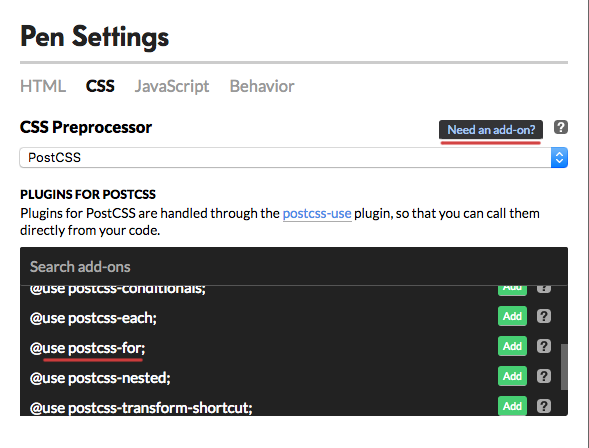@utilitycss/postcss-for
v0.0.4
Published
PostCSS plugin that enables SASS-like for loop syntax in your CSS
Downloads
1,214
Readme
PostCSS For Plugin
PostCSS plugin that enables @for loop syntax in your CSS.
Try it out!
You can try postcss-for directly from codepen. Just choose PostCSS as a preprocessor and pick desired plugin from the list.
Usage
postcss([require("postcss-for")]);Note, that unlike the Sass @for, postcss-for in the example below iterates from 1 to 3 inclusively.
@for $i from 1 to 3 {
.b-$i {
width: $(i) px;
}
}.b-1 {
width: 1px;
}
.b-2 {
width: 2px;
}
.b-3 {
width: 3px;
}This plugin must be set before postcss-nested and postcss-simple-vars. Therefore dollar variable cannot be used as a loop range parameter. If you do want to use predefined range parameters though, consider using postcss-custom-properties with postcss-at-rules-variables, or look into this postcss-for fork.
More features
By keyword is available:
@for $i from 1 to 5 by 2 {
.b-$i {
width: $(i) px;
}
}.b-1 {
width: 1px;
}
.b-3 {
width: 3px;
}
.b-5 {
width: 5px;
}Locality of variables in nested loops is supported:
@for $x from 1 to 2 {
@for $y from 1 to $x {
@for $z from $y to $x {
.c-$(x)-$(z)-$(y) {
padding: $(x) em $(z) em $(y) em;
}
}
}
}.c-1-1-1 {
padding: 1em 1em 1em;
}
.c-2-1-1 {
padding: 2em 1em 1em;
}
.c-2-2-1 {
padding: 2em 2em 1em;
}
.c-2-2-2 {
padding: 2em 2em 2em;
}See PostCSS docs for examples for your environment.

